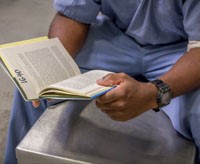2019
OFFENDER POPULATION JUNE 30, 2019
INMATES: 95,626
SUPERVISED: 164,655
INMATES: 95,626
SUPERVISED: 164,655

Secretary Mark Inch
On January 14, 2019, Governor Ron DeSantis appoints Mark Inch as Secretary of the Florida Department of Corrections.
Prior to this appointment, Inch was the Director of the Federal Bureau of Prisons, and he also served as the Provost Marshal General/Commanding General, Criminal Investigation Command (CID) and Army Corrections Command, where he was responsible for oversight of the Army Corrections System. His stated goals during his tenure are to reduce staff attrition and vacancy rates; reduce inmate violence, addiction, and idleness; enhance cooperation through positive choices; maximize efficient and effective healthcare, and address aging infrastructure.
Passing of HB 7057 expands the applicant base for correctional officers within the state prison system to help address growing staffing shortages. The legislation changes the minimum age requirement for a correctional officer from 19 to 18 years of age as of July 1, 2019. Applicants may enroll in a correctional officer academy and gain the required training and credentials prior to certification.
SECOND CHANCE GRADUATES
Forty-seven students graduate from the Second Chance Pell Program at Columbia C.I. Annex. The Department’s partnership with Florida Gateway College results in the successful conferring of 26 Associate of Science degrees, 22 Associate of Arts degrees, 26 Water Quality Technician certifications, 25 Environmental Science Technology certifications, 26 Wastewater Treatment Plant Operations certifications, and 132 National Center for Construction Education and Research (NCCER) industry-recognized credentials; one graduate earned both an A.A. and an A.S. degree.
Chromebook-based computer labs are put in place at all academic program sites. These wirelessly networked labs extend educational opportunities to inmate students by increasing the capacity for online academic programming. Currently, all TABE testing for general population inmates is conducted in the labs with plans to expand this capacity to deploying multiple other program curriculums.
Compass 100, a mandatory 100-hour job readiness and life management skills program for inmates releasing from the Department, is expanded to more than 12,000 inmates by deploying the curriculum on inmate tablets.
Fifteen Faith and Character-Based Program graduate dorms are created with the expansion goal of 34. The purpose of the dorms is to allow graduates to continue thriving in the positive environment established by the program after they have graduated.
 FDC pilots six new job assignment credentialing programs: Construction Worker, Food Service Worker, Farm Worker, Horticulture Worker, Office Specialist, and Warehouse Worker. For each credentialing program, the inmate has to meet a standard set of competencies to successfully graduate. Each credentialing program has a subject matter expert to instruct, integrate industry-related credentials and certify the program participants’ skill sets.
FDC pilots six new job assignment credentialing programs: Construction Worker, Food Service Worker, Farm Worker, Horticulture Worker, Office Specialist, and Warehouse Worker. For each credentialing program, the inmate has to meet a standard set of competencies to successfully graduate. Each credentialing program has a subject matter expert to instruct, integrate industry-related credentials and certify the program participants’ skill sets.
Last year, Hurricane Michael hit Gulf Correctional Institution, causing significant damage to the facility and forcing staff and more than 5,000 inmates to evacuate. FDC staff work hard to return the Main Unit to operational status and Gulf CI staff return on July 1, 2019, using a staged approach for returning inmates.
By securing funding for the architectural design of a new inpatient mental health facility at Lake Correctional Institution, FDC plans to improve treatment outcomes for inmates. Renovations are also completed on the inpatient mental health unit at Florida Women’s Reception Center.
DRONES
 HB 7057 amends the definition of “critical infrastructure facility” to include state correctional institutions and county detention facilities, among others, to the list of facilities protected by Florida law from drone operation over, near, or in contact with such facilities. Drones pose a wide range of security challenges to prisons, including the risk of contraband introduction. Criminalizing knowingly and willfully operating a drone over a facility such as a state correctional institution will help deter and reduce the introduction of dangerous and illegal contraband.
HB 7057 amends the definition of “critical infrastructure facility” to include state correctional institutions and county detention facilities, among others, to the list of facilities protected by Florida law from drone operation over, near, or in contact with such facilities. Drones pose a wide range of security challenges to prisons, including the risk of contraband introduction. Criminalizing knowingly and willfully operating a drone over a facility such as a state correctional institution will help deter and reduce the introduction of dangerous and illegal contraband.
FDC initiates a review of the Delegation of Immigration Authority Section 287(g) Immigration and Nationality Act, permitting designated officers to perform immigration law enforcement functions if the local law enforcement officers receive appropriate training and function under the supervision of ICE (Immigration and Customs Enforcement) officers.
FIRST IN NATION - PSYCHOLOGICAL RESIDENCY PROGRAM
FDC became the first correctional agency in the nation to have a Psychological Residency Program accredited by the American Psychological Association (APA). The residency program has operations at three facilities serving mentally ill inmate populations.
Kronos, an electronic timekeeping system, is implemented to more precisely account for time and attendance of staff. FDC also uses the Roster Management System (RMS) separately for security staff schedules and timekeeping records.
On the Community Corrections front, the Interactive Offender Tracking System (IOTS) is implemented. This system targets low risk offenders on probation or pre-trial supervision with a reduced level of oversight, while still holding them accountable, and freeing probation officers to more closely supervise more serious offenders. It’s a telephone reporting system that uses voice biometrics to identify the offender with a web-based management system.
Per new laws relating to Amendment 4, FDC creates court-ordered financial reports to produce two automated Termination of Supervision Letters. These letters are for offenders terminating supervision, and the reports assist in determining if an offender has outstanding financial obligations due when they terminate.
 Two new Inmate Tutor Assistance (ITA) training sites at Hernando CI and Walton CI are certified. This increases FDC’s ability to train inmates to become certified ITA tutors. ITA tutors support academic education programs in over 30 institutions.
Two new Inmate Tutor Assistance (ITA) training sites at Hernando CI and Walton CI are certified. This increases FDC’s ability to train inmates to become certified ITA tutors. ITA tutors support academic education programs in over 30 institutions.
The Digital Disbursement System allows the use of digital Electronic Funds Transfers (EFT) disbursement transactions to individual victims and issues electronic payments to participating Clerks of Court. Automating the previous process saves time and money.
After negotiations, the Department’s Comprehensive Healthcare Contractor (Centurion) agrees to implement, maintain, and support an electronic medical record (EMR) system in accordance with Electronic Health Record System Requirements as part of their contract renewal.
The recidivism rate for inmates increases to 25.4% (for inmates who were released in 2016), meaning for those inmates who were released in 2016, 25.4% of them returned to a Florida state prison within a three-year period.
There are two executions in 2019. They are:
- Robert Long (34 years on death row); and
- Gary Bowles (almost 23 years on death row).
- 1821-1845
- 1868-1876
- 1877-1895
- 1900-1919
- 1921
- 1922-1924
- 1927
- 1928-1931
- 1932 | CHAPMAN
- 1933-1935
- 1936-1939
- 1940-1945
- 1946-1949
- 1950-1955
- 1956-1961
- 1962 | WAINWRIGHT
- 1963-1965
- 1966-1969
- 1970-1975
- 1976-1979
- 1980-1986
- 1987 | DUGGER
- 1988-1990
- 1991 | SINGLETARY
- 1992-1995
- 1996-1998
- 1999 | MOORE
- 2000-2002
- 2003 | CROSBY
- 2004-2005
- 2006 | MCDONOUGH
- 2007
- 2008 | MCNEIL
- 2009-2010
- 2011 | BUSS
- 2011 | TUCKER
- 2012 | CREWS
- 2013-2014
- 2014 | JONES
- 2015-2018
- 2019 | INCH
- 2020-2021
- 2021 | DIXON
- 2022-Today
- Population Summary Table

